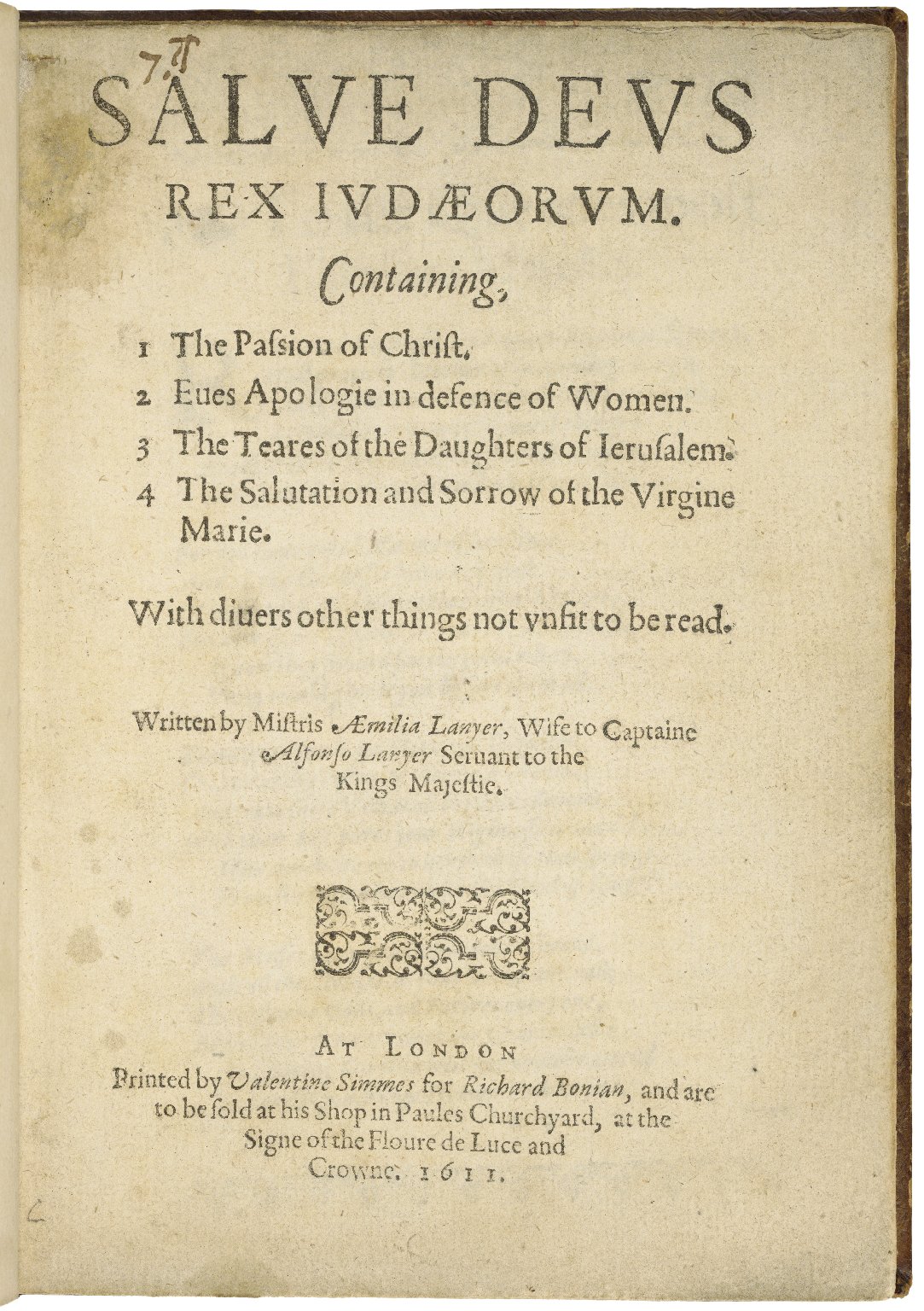Aemilia Bassano Lanier (also spelled Lanyer) is the heroine of my new novel The Dark Lady’s Mask. Born in 1569, she was the highly educated daughter of an Italian court musician—a man thought to have been a Marrano, a secret Jew living under the guise of a Christian convert. She may have also been the mysterious, musical Dark Lady of Shakespeare’s sonnets, although most academic scholars dispute this. What we do know and what really matters is that she was the first English woman to pursue a career as a published poet.
In Protestant England, Lanier effectively had only one option—to write devotional Christian verse. Her literary predecessors, Anne Locke and Mary Sidney, wrote poetic meditations on the Psalms.
But Lanier turned this tradition of women’s religious poetry on its head. Published in 1611, her Salve Deus Rex Judaeorum (Hail God, King of the Jews) is an astonishing tour de force.
In this epic narrative, Lanier unfolds the drama of Christ’s passion as seen through the eyes of the women in the Gospels. Her searing poetry connects women’s suffering and oppression in male-dominated culture directly to Christ’s great mystery of redemption and triumph over the forces of ignorance and evil. Lanier upholds virtuous women as Christ’s true imitators.
Salve Deus is dedicated and addressed exclusively to women, and is prefaced by nine praise poems dedicated to the royal and aristocratic women whose patronage Lanier sought. She also included a dedication in praise of all women.
Having thus established her female audience, Lanier attacks the theological roots of male domination, namely the blame attached to Eve—and by extension all women—for humanity’s fall from grace. In “Eve’s Apology in Defence of Women,” Lanier argues that the original sin was actually Adam’s for accepting the forbidden fruit. For he, unlike Eve, was fully aware of the consequences. Out of selfishness and desire for power, Adam let Eve take the fall.
If Eve did err, it was for knowledge sake,
The fruit being fair persuaded him to fall:
No subtle serpent’s falsehood did betray him,
If he would eat it, who had the power to stay him?
Not Eve, whose fault was only too much love.
Writing through the viewpoint of Pontius Pilate’s wife, Lanier contends that male culpability in crucifying Christ far exceeds Eve’s tragic misunderstanding. Therefore there is no moral or divine cause to justify women’s subjugation. Here Lanier explicitly champions women’s rights and freedoms:
Let us have our Liberty again,
And challenge to yourselves no Sovereignty,
You came not into the world without our pain,
Make that a bar against your cruelty;
Your fault being greater, why should you disdain
Our being your equals, free from tyranny?
If one weak woman simply did offend,
This sin of yours hath no excuse, nor end.
Lanier’s poetry lays claim to women’s God-given call to rise up against male arrogance, just as the strong women of the Old Testament rose up against their oppressors. While wooing her highborn female patrons, Lanier uses the scriptures to assert a sense of social egalitarianism that foreshadows the Levellers and the Quaker religious movement that emerged a few decades after her poetry’s publication. “God makes both even, the cottage with the throne,” Lanier writes in her dedicatory poem to her former pupil, Lady Anne Clifford. (Clifford was herself a feminist firebrand who fought long and hard to regain her properties after her father disinherited her because of her sex. Anne Clifford was an ancestor of Vita Sackville West and the historical inspiration for Virginia Woolf’s novel, Orlando.)
Salve Deus Rex Judaeorum is a corpus of poetry celebrating female and divine goodness, a radical and ground-breaking piece of work that offers nothing less than 17th century liberation theology.
On this good Friday, I wish peace and justice for all.
Pax Christi




